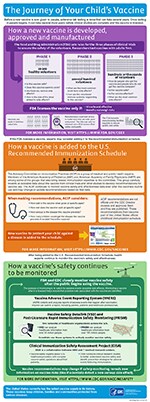Who Sets the Immunization Schedule?
As part of its mission to promote health and prevent disease, CDC publishes written recommendations for vaccinating US children and adults. These recommendations are set to protect infants, children, adolescents, and adults against vaccine-preventable diseases.
Medical and public health experts review available data on newly licensed and existing vaccines. These experts, who include vaccine experts, scientists, doctors, and public health professionals, form the Advisory Committee on Immunization Practices (ACIP).
ACIP meets 3 times each year to discuss vaccine recommendations. They consider
- How safe and effective the vaccine is when given at a specific age
- The severity of the disease the vaccine prevents
- How many people get the disease if there is no vaccine
- How well the vaccine helps the body produce immunity to the disease
The final vaccine recommendations include the
- Number of doses of each vaccine,
- Timing between each dose,
- Age when infants and children should receive the vaccine, and
- Precautions and contraindications (who should not receive the vaccine).
CDC sets the immunization schedules based on ACIP’s recommendations. The childhood and adolescent schedules are also approved by the American Academy of Pediatrics (AAP), the American Academy of Family Physicians (AAFP), and the American College of Obstetricians and Gynecologists. The adult schedule is also approved by the American Academy of Family Physicians, the American College of Obstetricians and Gynecologists, the American College of Physicians, and the American College of Nurse-Midwives.
Learn in words and pictures about the journey of your child’s vaccine, including how a vaccine is added to the US recommended schedule.

